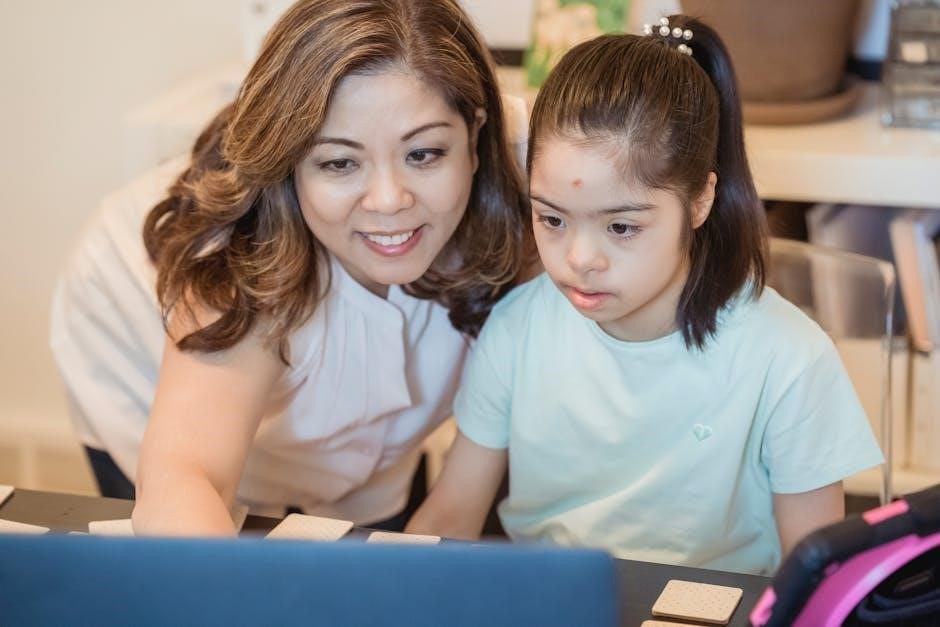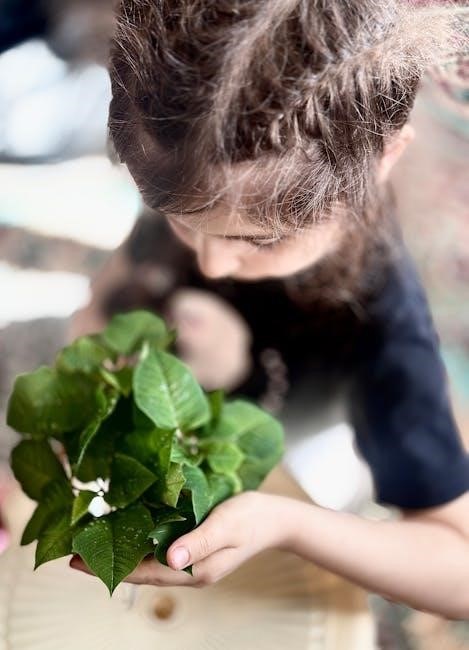Puberty is a natural biological process marking the transition from childhood to adolescence․ It involves physical changes‚ such as growth spurts and hormonal shifts‚ and emotional development․ This phase typically begins between ages 9-14 and lasts several years․ Understanding puberty helps girls navigate this transformation with confidence and prepares them for adulthood․
1․1 Understanding Physical Changes

During puberty‚ girls experience significant physical changes․ These include growth spurts‚ breast development‚ and the onset of menstruation․ Body hair appears in areas like the underarms and pubic region․ Skin changes‚ such as acne‚ may occur due to hormonal shifts․ These transformations vary in timing and pace for each individual․ Understanding these changes helps girls feel prepared and empowered․ Proper hygiene‚ like using menstrual products and skincare routines‚ supports health during this phase․ These physical developments are natural signs of maturation‚ marking the journey from childhood to young adulthood․
1․2 Emotional Changes During Puberty

Puberty brings emotional shifts as girls navigate new feelings and social dynamics․ Mood swings‚ caused by hormonal changes‚ are common․ Many experience heightened self-consciousness and sensitivity․ It’s normal to feel uncertain or overwhelmed as they explore their identity․ Open communication with trusted adults and friends can provide support․ Encouraging positive self-talk and self-compassion helps build resilience․ Understanding these emotional changes fosters empathy and self-awareness‚ equipping girls to handle challenges with confidence and grace during this transformative phase․
Building Self-Esteem and Confidence
Building self-esteem and confidence involves fostering a positive self-image and empowering girls to embrace their strengths․ Encouraging self-expression and celebrating achievements helps cultivate resilience and self-assurance․
2․1 The Importance of Positive Body Image
A positive body image is crucial for building self-esteem and confidence․ It helps girls appreciate their unique qualities and fosters self-acceptance․ Societal pressures often distort perceptions‚ making it essential to promote self-love and challenge unrealistic beauty standards․ Encouraging girls to embrace their bodies fosters resilience against negative influences․ Healthy habits‚ such as proper skincare and hygiene‚ also contribute to feeling good about oneself․ By nurturing a positive body image‚ girls can develop a stronger sense of self-worth and confidence‚ which are vital for overcoming challenges and thriving in life․
2․2 Overcoming Self-Doubt and Insecurities
Overcoming self-doubt and insecurities is a vital part of building confidence․ Girls often face pressures that can lead to negative self-perceptions․ Recognizing and challenging these thoughts is key․ Encouraging open conversations and fostering a supportive environment helps girls address their fears․ Practicing self-compassion and celebrating achievements‚ no matter how small‚ can boost self-esteem․ Surrounding oneself with positive influences and role models also plays a significant role․ By learning to reframe insecurities and focus on strengths‚ girls can develop resilience and confidence‚ enabling them to navigate challenges with greater ease and belief in their abilities․

Health and Hygiene Tips
Healthy habits‚ such as regular skincare routines and proper hygiene practices‚ are essential during puberty․ These routines help maintain confidence and overall well-being‚ fostering a positive self-image․
3․1 Proper Skincare Routine
A proper skincare routine is essential during puberty to manage hormonal changes and prevent acne․ Start with a gentle cleanser twice daily to remove dirt and excess oil․ Follow with a moisturizer to hydrate and balance the skin․ Sunscreen is crucial; use a broad-spectrum SPF 30 or higher every morning․ Opt for non-comedogenic products to avoid clogged pores․ Avoid harsh products that can irritate the skin․ Remove makeup thoroughly before bed to prevent breakouts․ Be gentle‚ avoiding over-scrubbing‚ and exfoliate once or twice a week․ Stay consistent‚ as results may take time․ Everyone’s skin is different‚ so experiment to find what works best․ Consult a dermatologist for persistent issues․ A consistent routine fosters healthy‚ glowing skin and boosts confidence․

3․2 Maintaining Personal Hygiene
Maintaining personal hygiene is crucial during puberty to ensure health and confidence․ Shower or bathe daily to remove dirt and excess oil‚ using mild soap․ Use deodorant or antiperspirant to manage body odor․ Wash hands frequently‚ especially before eating and after using the restroom․ Keep hair clean and styled neatly‚ washing it 2-3 times a week․ Trim nails regularly and wear clean clothes every day․ These habits help prevent infections‚ reduce body odor‚ and promote a fresh‚ clean appearance․ Consistency is key to developing lifelong hygiene practices that support overall well-being and self-esteem․

Mental Health and Wellness
Mental health is vital for overall well-being during puberty․ Managing stress‚ practicing self-care‚ and seeking support when needed can help girls navigate emotional challenges confidently and healthily․
4․1 Managing Stress and Anxiety
Managing stress and anxiety during puberty is essential for mental well-being․ Techniques like deep breathing‚ journaling‚ and physical activity can help reduce tension․ Encouraging open conversations with trusted adults or friends fosters a supportive environment․ Understanding that stress is a natural response and learning healthy coping mechanisms can empower girls to handle challenges effectively․ Prioritizing self-care and maintaining a balanced lifestyle are key to managing emotional ups and downs during this transformative period․
4․2 Seeking Help and Support

Seeking help and support is crucial for navigating the challenges of growing up․ Girls should feel empowered to reach out to trusted adults‚ such as parents‚ teachers‚ or counselors‚ when facing emotional or mental health struggles․ Professional guidance can provide tailored strategies to cope with stress and anxiety․ Additionally‚ peer support groups or online resources can offer a sense of community and shared understanding․ Remember‚ asking for help is a sign of strength‚ not weakness․ Encouraging open communication and fostering a supportive environment helps girls build resilience and confidence during this transformative phase of life․

Navigating Relationships
Navigating relationships involves building trust‚ communication‚ and mutual respect․ Girls learn to balance independence with interdependence‚ fostering healthy connections with friends‚ family‚ and peers during growth․
5․1 Building Healthy Friendships
Building healthy friendships is crucial during adolescence․ Girls learn to establish trust‚ communicate openly‚ and support each other․ Encouraging empathy and kindness fosters strong‚ lasting bonds․ Healthy friendships provide emotional support and help navigate social challenges․ It’s important to surround oneself with positive influences and avoid toxic relationships․ Girls should prioritize friends who respect and value them‚ creating a foundation for lifelong connections․ This section offers practical advice on identifying true friends and maintaining meaningful relationships․
5․2 Understanding Family Dynamics
Understanding family dynamics is essential for adolescent girls‚ as family relationships play a significant role in emotional and social development․ Open communication‚ mutual respect‚ and trust are key to fostering a supportive environment․ Girls should learn to navigate changing roles within the family‚ such as gaining more independence while maintaining close bonds․ This section explores how to handle conflicts‚ set boundaries‚ and appreciate the unique contributions of each family member․ Building a strong‚ loving family connection provides a foundation for resilience and lifelong relationships․

Planning for the Future
Empowering girls to shape their futures involves setting goals‚ exploring education‚ and fostering personal growth․ This section guides them in making informed decisions for a fulfilling life․
6․1 Setting Goals and Aspirations
Setting goals is crucial for girls to achieve their aspirations․ Start with clear‚ achievable objectives in education‚ career‚ and personal life․ Break down larger goals into smaller steps to maintain focus and motivation․ Regularly reassess and adjust goals as circumstances change․ Encourage girls to explore their passions and strengths‚ fostering a growth mindset․ Support systems‚ like mentors or journals‚ can help track progress and celebrate successes․ Teaching goal-setting skills empowers girls to take control of their futures and work towards their dreams with confidence and determination․ This practice builds resilience and prepares them for lifelong success․
6․2 Career Planning and Education
Career planning and education are vital for girls to shape their futures․ Encourage exploring interests and strengths to identify potential career paths․ Developing skills like critical thinking‚ communication‚ and problem-solving is essential․ STEM fields‚ arts‚ and trades offer diverse opportunities․ Mentorship and career counseling can provide guidance․ Education should align with career goals‚ whether through college‚ vocational training‚ or apprenticeships․ Teaching girls to research industries and stay adaptable prepares them for evolving job markets․ Fostering a love for continuous learning ensures they remain competitive and fulfilled in their chosen careers․ Empowering girls with knowledge and skills sets them up for long-term success․
